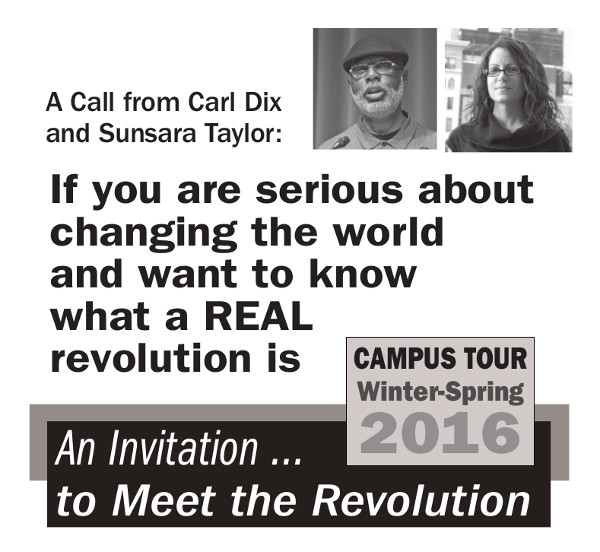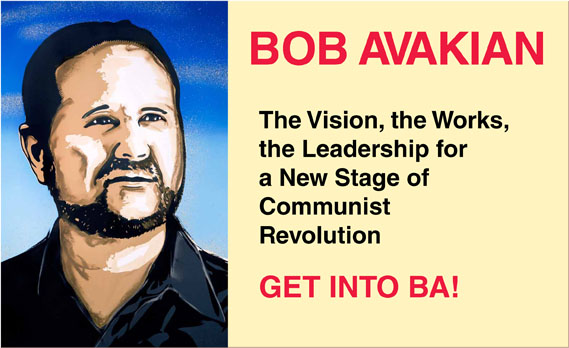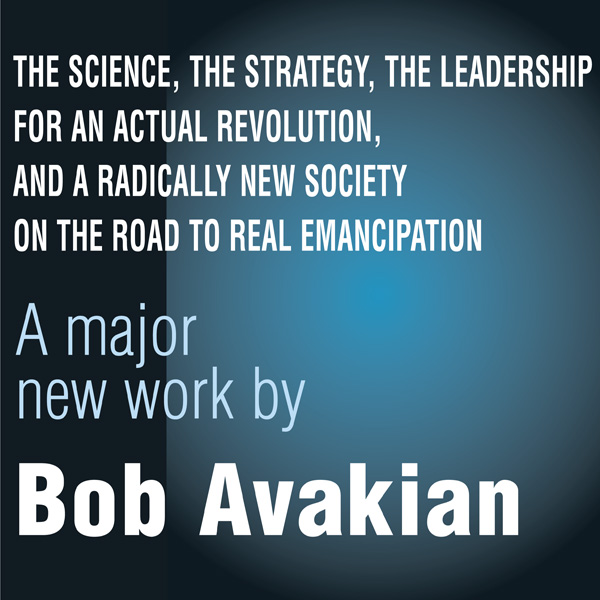Kicking Off the Carl Dix/Sunsara Taylor Speaking Tour at UC Riverside
February 8: The Beginning of a Journey
Reflections from students and Revolution Club members
February 22, 2016 | Revolution Newspaper | revcom.us
Sunsara Taylor and Carl Dix boldly brought the revolution to the University of California, Riverside (UCR) on February 8, to an audience of about 90 people as part of their Campus Tour, Winter-Spring, “An Invitation…to Meet the Revolution”. Their indictment of the capitalist-imperialist system and their enthusiastic call to recruit students into the movement for revolution based on Bob Avakian’s new synthesis of communism was heard by mostly undergrads, a couple of sociology and political science professors, and grad students.
UCR is a large public university an hour east of Los Angeles, with many first-time college goers. Students had heard about the event from multiple sources, including in-person classroom announcements by the Revolution Club, extra credit offered by a couple of Media Studies and Political Science classes, posters, and email blasts sent to various classes. An older Black student very into Buddhism said he came off of seeing a flyer in the library. Many simply said they were intrigued by this event’s association with revolution and communism, and felt compelled to check that out since they’ve rarely seen communism portrayed as a positive alternative. That same morning, a leader of the Organization for Black Struggle (from St. Louis) was speaking in front of about 30 people, and the revcoms made an announcement at that event about Carl and Sunsara. Off of this, they got invited to announce the event in a class on labor and social movements, taught by the same professor who was helping host the Organization for Black Struggle’s talk.
Right from the beginning of their talk, Carl and Sunsara had our attention. Sunsara listed many of the statistics of mass incarceration and police murder, and viscerally brought the human side of this injustice to bear. Carl agitated about women’s oppression and exposed the lie that “women have made it” in the U.S. And then they challenged the audience. It was sharp and the delivery real and passionate. I also appreciated how each speaker shared some personal history about how they themselves went through transformation and ultimately joined up with Bob Avakian’s leadership.
The Q&A was also quite lively, and more than a little contentious at times! A swath of the audience kept raising big questions: religion, Bernie Sanders, and the particular role of BA. Specifically, I remember one grad student asking: Are you trying to win a certain amount of people before the revolution to your program, or are you saying you will have the revolution and then win people later? Since it might not only be the “system” fighting back, will this be more like a civil war? Is your method authoritarian, or democratic? Others asked: Isn’t it helpful that Bernie Sanders is talking about socialism? Do you join other movements working with other groups, such as against the “TPP” [Trans-Pacific Partnership] trade deal, or not? Who decides in the new society what is offensive, and how are those decisions made? As in, on misogyny in music: Do communists have a notion of “political correctness,” and isn’t it tricky to impose our own morals on artistic liberties? What is an example of the new synthesis? How does it concretely apply to today?
These were many of the issues that came up after the presentations. Throughout the event, the students with the Revolution Club at UCR openly said that anyone liking what they’ve heard, or wanting to learn more about how they can get involved, should sign up at the table and get organized with the club. There was a follow-up meeting a few days later, and nine students from the event came, including people who had asked tough questions at the event. Among these, a few were excited to get down with the club and stage an intervention on campus the following week using some of the quotes from BAsics, from the talks and writings of Bob Avakian. A Black activist student who had to leave early from Carl and Sunsara’s talk said he wants to meet Carl, and that the Rev Club is welcome to join a disruptive action he and his group(s) have planned for Black History Month. In some form or another, many people impacted by the tour’s first stop have just embarked on a “crucial journey,” to quote BA’s Invitation that has been printed in Revolution newspaper.
Not everyone who heard the talk decided to jump in and join the Revolution Club. For example, a couple of people who were previously around Stop Patriarchy on this campus expressed hesitation on doing any further work with the revolution. This is part of the flow of things: some people get hit with accusations, or they anticipate the accusations that will come, and they shrink back, convincing themselves that we don’t really need all this theory and this whole communist approach in order to be a part of “creating a safer world.” The Rev Club’s approach is to keep the door open to all these folks, but also to underscore the title of the event: What will it take to get free? Because that IS what we are talking about: not just a few reforms or safe spaces, but a whole new liberated world. Some of the people I talked to the next day said they disagreed with revolution, but when pressed, said they didn’t know what it would take to deal with the system, or whether it was even possible.
A grad student who loved the program observed that some people seemed to keep filtering what was said through their own blinders, and clung to their beliefs even after these beliefs were challenged and an alternative was put forward. I agree that some of this was going on during the Q&A. This is not so surprising. In fact, it really seems like part of the process that needs to go on if there is going to be a revolutionary movement on the campuses with a communist core that won’t lower its sights to anything less than freeing the seven billion human beings who need this. Some people will come wanting to pose their challenges but not really get involved, and others will ruminate (together with the club, or just on their own) on what they heard. But everyone will be touched, and quite a few will be eager for continuing on this journey.
The presentation clearly rocked some people’s worlds and challenged their basic thinking. After all, this was its mission statement! But more than that, this ideological challenge was needed, and it was artfully done. We heard second-hand that someone connected to the facilities management really didn’t like that this was going on, and made a big deal about our chalking the ground without a permit (!), but the professor who helped get the room apparently stood up to this person and defended the event. The professor’s ability to get future rooms for his own future conferences might have been undermined if this facilities person wanted to keep messing with him. So he defended it by saying that this event was very educational. After the event, he was telling another student in his office why HE enjoyed it, saying it made him think. In this way, the impact was felt more broadly than by just those who attended.
This is the first event (including all the previous protests and speak-outs we have organized or been present at) after which there is actually a diverse core of students stepping forward who are either down to join the club, or who are actively weighing whether (and on what terms) to get involved. Getting the club organized in a concrete, immediate way is clearly the next challenge, but the tour put some real wind in our sails at the same time as it placed more responsibility in our hands.
We have the benefit of knowing what some of the undergrad students thought because some of them did a class write-up on how it relates to racial inequality. We would like to share some of these responses. One of these students wrote: “As an African American, I felt that I could relate to the issues Dix mentioned. However, his perspective challenged me to take a more macro approach to understanding how American imperialism has contributed to racial inequality. Equally, Taylor challenged my perspective as a male.... Both activists also challenged me to consider what type of world I want to live in.”
A Latino student admitted that his family lives decently, and hasn’t been discriminated against by authorities. His outlook had usually been one of tolerating the problems of the system as not urgent to him, and pretty much “the way it is.” So he thought he would just hear another diatribe against “The Man,” but he later wrote about how he learned that these problems are worldwide, and that there needs to be more pressure for there to be a change. Then he started wrestling with the proposed solution that Carl and Sunsara had been laying out. He tended to think communism would benefit “minorities,” but that most of these same minorities are turned off by it and not educated about it, plus most people in the U.S. would have to be “really suffering” for this revolution to take place, so he reasoned that maybe this movement is just “talking to intellectuals and the middle class,” because these strata would be more able to understand it and take it up. He knew Marx said the proletariat had nothing to lose but their chains, but the student also thought “minorities have some source of entitlement,” meaning that many people from oppressed backgrounds feel they have a stake in the American dream. When asked if he would get involved, he said he’s not a “real activist,” but definitely wants to explore these ideas more with us.
A Latina feminist “really liked how they both related racial oppression to sex/gender oppression.” Significantly, another Latina wrote: “I really enjoyed how Sunsara, a white woman, was speaking for African Americans and how they should be fighting. As well as how Carl, an African American man, was speaking for women. This stood out to me.”
Yet another Latina responded: “I kept hearing about this event on campus multiple times. The flyer mentioned a revolution involving communism. This is what really caught my attention. Communism is not something that is really heard of anymore. It’s a political ideology that has many negative connotations. So I was really surprised and intrigued by this notion.”
Another student had the same reaction, saying, “I was a little surprised when I read that it was about the Revolutionary Communist Party, but I really wanted to learn more. For the amount of time that I was there, I was intrigued.”
Finally, another student said the event caught her interest when it was posted to her class website: “I’ve always been interested in hearing about what is going on in our country and what our government’s agenda is to its people, as well as other people around the world. Also, the fact that communism was being discussed held a huge interest for me. A majority of people today, I believe, hear the word communism and it automatically has a negative connotation and people are against it, so I was genuinely interested to hear their vision and see the plan in which it could help our path to a real revolution in our country today because I do believe there needs to be a change in our structural system in order to do this.” This person said she was “semi aware” about movements like Black Lives Matter, but that the “heartbreaking” cases she heard at the event made her do some of her own research when she went home. She said that this really showed her “how oppressive our government is against people of color,” but more importantly, how the masses aren’t even aware of it, especially about how women faced many struggles here “as well as in other countries under the patriarchal society.” She enjoyed the program and came away convinced that we need a revolution to bring about “equality for all.”
It’s important to appreciate how much this event not only made some people “aware” of deep injustice and about BA’s new synthesis, but actually moved people viscerally as well as cognitively. It introduced them to the theoretical tools that they can use to pursue these questions further, while moving to organize them on the spot. The fact that Carl and Sunsara are planning to spend bigger chunks of time on the campuses with the Rev Clubs and with students thirsty for this kind of engagement is a huge strategic resource for the whole revolution at this point in time.
Volunteers Needed... for revcom.us and Revolution
If you like this article, subscribe, donate to and sustain Revolution newspaper.










